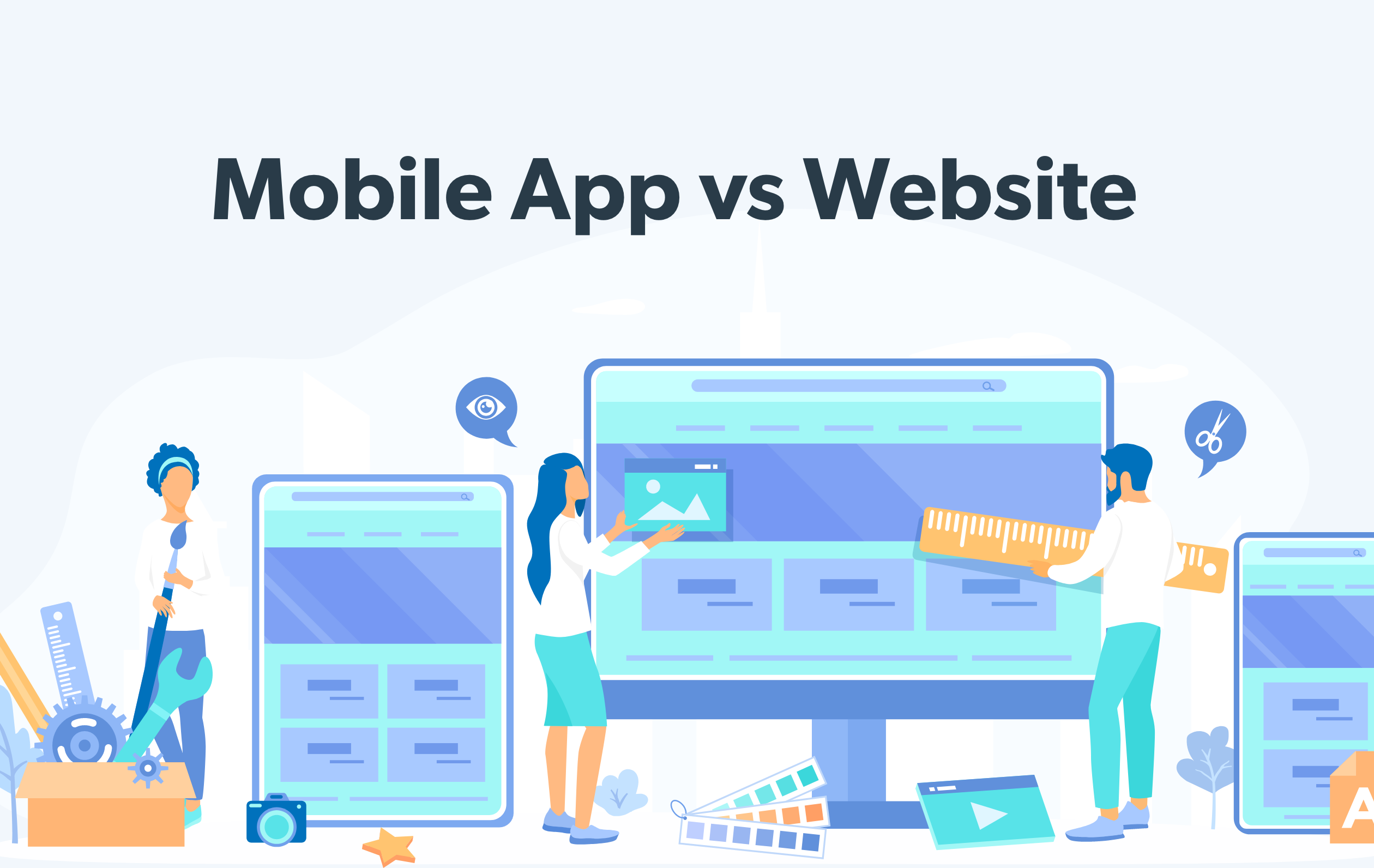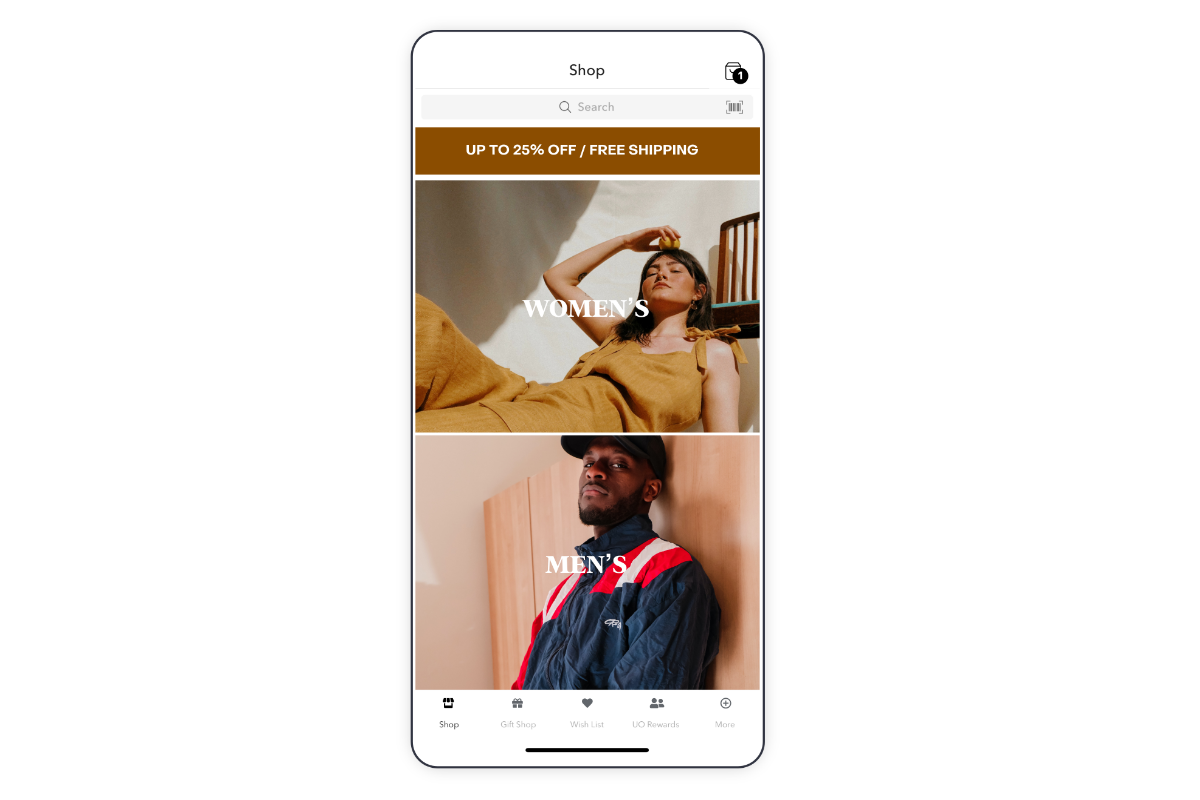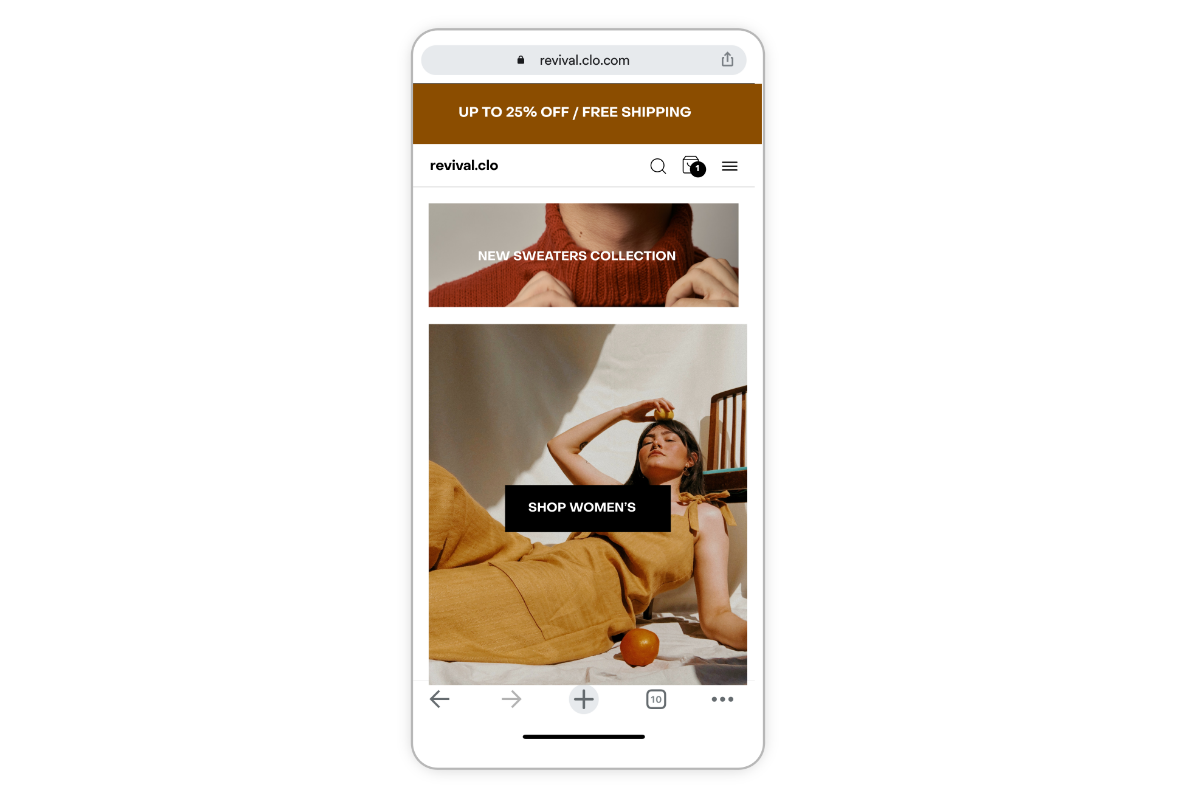By Benjamin Arp | February 7, 2023

See why top ecommerce brands use Miva’s no-code platform to run
multiple stores, manage massive catalogs, and grow their revenue.
As an online seller who may already have an ecommerce platform, you might be wondering whether to invest in your ecommerce website vs app development for your business to stay current. The trends can be persuasive on paper—mobile commerce sales in the US are expected to double between 2020 and 2025, and many sellers are racing to meet this growing trend head-on.
However in order to best promote your brand to those mobile shoppers, you need to understand the different tools that are available, and which one will best suit your business. Do you really need a standalone mobile app, or is a great mobile experience what will really deliver? Before answering this question, it's important to think about the core differences between an app vs website as they apply to how your customers shop and how you want to build your business. While the two options have some similarities, each also have unique strengths and weaknesses to consider.
In this article, we analyze how to determine which mobile solution is the better primary investment for your business.
A mobile website is a mobile-optimized version of a company’s website that can be accessed via a mobile device’s browser. An app, on the other hand, is a standalone software application that is downloaded and installed on a mobile device. For online businesses, deciding how to allocate resources between the ecommerce website vs app development can feel daunting, as no seller wants to leave any customer preferences unaccounted for. Similarly, no seller wants to spend more than they have to when striving for the best results.
An app—short for “software application”—is a program that is downloaded on a mobile device from an app marketplace to work on an operating system like iOS or Android. Some companies build apps to encourage customers to interact with their brand and products in a self-contained experience on their mobile devices.
Progressive Web Apps: In recent years, "progressive web applications” (PWAs) have emerged as a useful alternative to traditional apps. PWAs are essentially websites built to display in an app-like way, sometimes with features like full-screen display and push notifications, when accessed by a device with a certain screen size.

Maintaining both an ecommerce website and mobile app presence each have important roles for modern digital businesses, but they do not have equal benefits. The biggest advantage of an app is that it is an “owned marketing channel.” This means that your app lives on your customer’s mobile device, allowing your business to communicate directly with them through push notifications and to curate information based to their interests, location, and usage behavior. No third party intermediary gets in the way. This enables you to send tailored offers and recommendations to customers that keep them shopping within your app.
Today’s shoppers want to see unique and personalized online experiences. Users that download your app are often your best customers, and you’re able to provide a very good experience to these high-intent shoppers with a direct marketing channel that you own and control. Apps can offer faster access to your content and provide smoother interactions with your brand, making it easier to move shoppers down the conversion funnel.
There are other benefits of having an ecommerce app vs website, including:
Since most shoppers have mobile devices on them, an app allows your business to reach your customers in potentially more personal ways. The ability to connect with both customers and new users that are aware of your brand opens up additional touchpoints for your business and allows you to build relationships with them.
In addition, some apps can be used offline. While functions like checking out only work online, basic app information like store hours and products can be accessible without service. This provides additional accessibility for shoppers.
Because an app is designed specifically for mobile devices, your business will be able to take advantage of unique mobile device features like:
For example, you can set up geolocation to allow shoppers to locate a nearby retail location or integrate with a mobile camera to enable shoppers to upload pictures to the app. These features are important to consider when deciding between an app vs website, but the first question should always be, “Do I need these specific features for my business and my customer?”
Ecommerce website and app development each require significant time and care to execute well. While apps certainly provide a convenient experience for users, creating a mobile app is not just a one-time endeavor. To make your app successful (and profitable), your business needs to invest in developing, publishing, maintaining, and marketing your app. While you would also need to do the same with a mobile website, an app can sometimes require more development and marketing to create a solid experience and to ensure your customers use it.
For a big name business with a large marketing budget, getting your customers to use your app may be easier to accomplish. However, for many sellers, getting casual users to find your app and to commit to shopping on it may be more challenging. Your app needs to offer some unique and valuable functionality for users to want to adopt it.
With marketing channels like social ads, PPC, and SEO, you are dependent upon other companies and providers to surface your ads. This makes your business vulnerable to being “cancelled”, to algorithm changes, and to rising advertising costs. If you go the app route, you are more likely to navigate these challenges than with a desktop ecommerce site since an app can require considerably larger marketing efforts.
Finally, an app isn’t directly accessed on the internet, as desktop website experiences are—apps must be downloaded and installed on a mobile device. An app requires you to provide regular upgrades and fix compatibility issues for every type of operating system. This means having to deal with a plethora of coding languages, each of which may require a different specialist to execute. Compare this to the simplicity of developing web pages with a high quality website page builder. App publication and updates often require submitting the app to an app store for approval. With each update, you’ll also have to inform users to update their app—wasting other valuable communication opportunities with your audience.
A ecommerce website is your online storefront—a centralized virtual store which houses your products, displays branding, facilitates transactions, and connects shoppers with customer service. A website is more than these basic functions though...your website also shapes your customer’s impression of your ecommerce business, guides them along the purchase journey, and serves as the focal point for how shoppers find and interact with you and your products. As more and more shoppers use their mobile devices to shop online, you need to make sure your website is enabled for mobile and delivers a mobile-first shopping experience.
A “mobile website” describes when your website is fully optimized for mobile devices. This means that all of your site content—from your navigation and checkout process to product pages and banners—is responsive and can be viewed effectively on smaller screens. A mobile website is different than a mobile app in that it is not a standalone piece of software which needs to be installed onto a device. That’s an important distinction to make when deciding between a mobile app or website approach. When weighing the pros and cons of apps vs website remember this key point: If the ecommerce website “just works” on a range of devices without needing a discrete application, shoppers will be able experience the bells and whistles of your website on any mobile or desktop device of choice. That versatility translates into a better shopping experience for more customers. 
A website may be sophisticated and functional on a desktop, but it may not offer the same experience across different mobile device brands, sizes, and types. Having a mobile-optimized site ensures that customers can still experience the best features of your website without compromise, creating a consistent brand experience. If you don’t have to ask your customers to do any extra legwork to get this experience (ie find, download, and install an app), the benefits of mobile web vs mobile app are even more obvious. “Mobile-first” simply means designing an ecommerce website with mobile accessibility at top of mind—a popular modern strategy which strongly undercuts the case for mobile apps.
Other reasons a mobile-optimized site comes out on top in the app vs website debate include:
Unlike an app that’s downloaded from a store, a website is indexed by search engines. This makes it easier for visitors to search for and find your website, giving you broader reach and visibility.
A mobile-optimized website is connected to the internet and can be accessed online. It does not need to be downloaded like an app. Because it’s accessed online, a website can be easily shared between users and published on other platforms and channels unlike an app. This shortcut to “social proof” is a significant drawback for a mobile app vs mobile website social sharing.
A mobile website is designed to be compatible with any device. Unlike mobile apps which only function on specific platforms (like iOS or Android), a responsive website can be accessed from any mobile device regardless of the operating system, which means users can drop off on one device and be able to continue the same experience on another device.
A website offers the benefit of responsive design, which means it will automatically scale to any screen size and provide an easy and robust viewing experience.
Mobile-optimized websites can be easier to maintain than apps. Any updates made to your site will display across all device types, whereas an app will require separate changes and development for each operating system.
Are apps more secure than websites? No. The broad range of devices, operating systems, and users’ individual security settings make apps far more costly and complicated to protect from attack than one centralized website owned by the business.
While both apps and mobile websites can be useful for an ecommerce business, it’s important to start first with a mobile responsive website. Your website serves as your brand’s flagship, and for many shoppers, it’s also the first touchpoint with your business. Having a strong mobile-optimized site is key to creating positive first impressions, attracting shoppers, and retaining customers.
As an ecommerce business, your mobile commerce goals are to deliver compelling content, establish your online presence, and provide a spectacular online experience that's easily shareable and searchable. A mobile-optimized site is the most logical choice to achieve these goals.
An app can also accomplish the same goals of promoting your business and engaging customers—however, its main benefits are providing a targeted standalone experience that takes advantage of mobile features. While an app can enhance your overall brand experience, you should invest first in a solid ecommerce website (with a strong mobile-optimized experience built into it) because this will serve as the primary driver for your business. Once your website is dialed in, an app can be the next step for your business.
If you’re looking for areas to improve on your website, our website health assessment tool is a great place to start.
This blog was originally published on November 19, 2021 and updated on February 7, 2023.
Back to topNo worries, download the PDF version now and enjoy your reading later...
Download PDF Benjamin Arp
Benjamin Arp
Benjamin Arp is a Miva Sales Engineer focused on driving ecommerce growth. He’s helped hundreds of ecommerce merchants develop their growth strategy, evaluate existing systems, and create plans to grow sales. In addition to working with merchants one-on-one, he is a regular contributor to the Miva blog and hosts webinars on a variety of ecommerce topics.
Visit Website